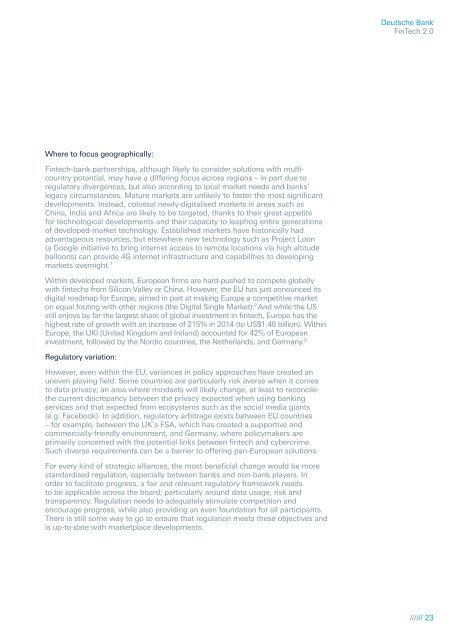FinTech 2.0
YKHHI
YKHHI
You also want an ePaper? Increase the reach of your titles
YUMPU automatically turns print PDFs into web optimized ePapers that Google loves.
Deutsche Bank<br />
<strong>FinTech</strong> <strong>2.0</strong><br />
Where to focus geographically:<br />
Fintech-bank partnerships, although likely to consider solutions with multicountry<br />
potential, may have a differing focus across regions – in part due to<br />
regulatory divergences, but also according to local market needs and banks’<br />
legacy circumstances. Mature markets are unlikely to foster the most significant<br />
developments. Instead, colossal newly-digitalised markets in areas such as<br />
China, India and Africa are likely to be targeted, thanks to their great appetite<br />
for technological developments and their capacity to leapfrog entire generations<br />
of developed-market technology. Established markets have historically had<br />
advantageous resources, but elsewhere new technology such as Project Loon<br />
(a Google initiative to bring internet access to remote locations via high altitude<br />
balloons) can provide 4G internet infrastructure and capabilities to developing<br />
markets overnight. 7<br />
Within developed markets, European firms are hard-pushed to compete globally<br />
with fintechs from Silicon Valley or China. However, the EU has just announced its<br />
digital roadmap for Europe, aimed in part at making Europe a competitive market<br />
on equal footing with other regions (the Digital Single Market). 8 And while the US<br />
still enjoys by far the largest share of global investment in fintech, Europe has the<br />
highest rate of growth with an increase of 215% in 2014 (to US$1.48 billion). Within<br />
Europe, the UKI (United Kingdom and Ireland) accounted for 42% of European<br />
investment, followed by the Nordic countries, the Netherlands, and Germany. 9<br />
Regulatory variation:<br />
However, even within the EU, variances in policy approaches have created an<br />
uneven playing field. Some countries are particularly risk averse when it comes<br />
to data privacy; an area where mindsets will likely change, at least to reconcile<br />
the current discrepancy between the privacy expected when using banking<br />
services and that expected from ecosystems such as the social media giants<br />
(e.g. Facebook). In addition, regulatory arbitrage exists between EU countries<br />
– for example, between the UK’s FSA, which has created a supportive and<br />
commercially-friendly environment, and Germany, where policymakers are<br />
primarily concerned with the potential links between fintech and cybercrime.<br />
Such diverse requirements can be a barrier to offering pan-European solutions.<br />
For every kind of strategic alliances, the most beneficial change would be more<br />
standardised regulation, especially between banks and non-bank players. In<br />
order to facilitate progress, a fair and relevant regulatory framework needs<br />
to be applicable across the board, particularly around data usage, risk and<br />
transparency. Regulation needs to adequately stimulate competition and<br />
encourage progress, while also providing an even foundation for all participants.<br />
There is still some way to go to ensure that regulation meets these objectives and<br />
is up-to-date with marketplace developments.<br />
////// 23


